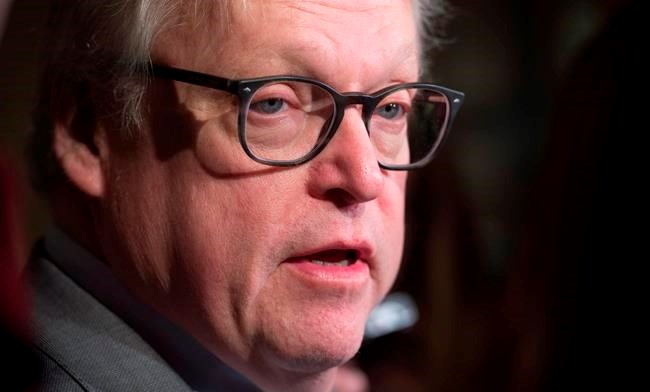|
OTTAWA — The gloves came off Monday as provincial and federal ministers tangled in Ottawa during another round of what has deteriorated into a bitter clash over long-term health funding. The provinces hurled accusations that the Trudeau government has refused to negotiate a new federal health-care funding framework, instead putting forward what the regional ministers consider a lacklustre take-it-or-leave-it offer. Federal Health Minister Jane Philpott, meanwhile, ducked questions Monday about their concerns, describing Ottawa's offer of mental health and home care cash as "historic" and "transformative." As the two sides met at an Ottawa hotel with no deal in sight, Quebec Health Minister Gaetan Barrette warned his province would walk out if the federal government didn't put more money on the table. The provinces said Ottawa's most recent proposal was a step back from the previous Harper government's plan. But the federal Liberals didn't appear ready to budge from an offer that would fix health-care increases at 3.5 per cent per year — up from three per cent — and add in about $8 billion over 10 years for home care and mental health. "They can't continue to make ultimatums, to make threats," said Manitoba Health Minister Kelvin Goertzen, who added that the provinces have long been demanding health-funding negotiations with Ottawa. "For months, we've been begging for this." British Columbia Finance Minister Michael de Jong was asked if his province would also walk out of the talks. "We'll see," he said. Philpott appeared wilfully blind to the dissent, saying she was "absolutely delighted" with her government's "substantial offers on the table" for the provinces as she skated around questions about the provincial concerns. "This is a transformative, historic offer — we're changing the face of health care in this country," she said. "I am certainly optimistic that the provinces and territories would not walk away from something like this." Under the federal proposal, health transfers would keep growing and would outpace provincial spending as well as inflation, which sits at 1.5 per cent, Philpott added. Clearly, none of it sat well with the provinces. "I don't want to over-dramatize this, but I think we are at a point of departure, potentially, for the federal government where we will see to what degree that notion of collaboration and co-operation is real or something else," de Jong said. Without a deal, the health-transfer arrangement would likely revert back to the Harper plan of at least three per cent a year, but provinces would also be looking to Ottawa to make good on an election promise to add $3 billion for home care. The provinces are responsible for delivering health care. They say that framework would leave them without the ability to innovate and modernize their delivery systems. However, with the federal government seeming to hold all the cards, Manitoba's health minister was asked Monday what kind of leverage the provinces actually have. "If they won't listen to us as health ministers — and they haven't over the last year — will they listen to the Canadians who are saying this has to change, our system isn't good enough, our people are waiting, our people are suffering, our families aren't getting the health care they need?" Goertzen said. "If they won't listen to that, I don't know what they'll listen to." An analysis by provinces released Monday compared the potential outcomes of the status quo versus federal Finance Minister Bill Morneau's latest offer. The data said that the status-quo scenario of annual increases of three per cent, or the average rate of nominal economic growth, in addition to $3 billion in targeted funding, would mean a total of $445.2 billion in federal health-care cash over the next decade. It would also lower the federal share of funding in provincial health budgets to 20.2 per cent in 2026-27 from 22.9 per cent next year. In comparison, the document said Morneau's offer of a firm 3.5 per cent annual increase and $8 billion over 10 years — earmarked for federal priorities like home care and mental health — would provide the provinces with total of $445.9 billion over the next decade. Under that scenario, the share of federal funding would fall to 19.8 per cent in 2026-27 from 23.1 per cent in next year, the data noted. The offer could mean even less money for provinces over the next decade, compared to the existing Liberal plan, de Jong said: invest $3 billion over four years into home care and allow the six per cent annual increase in transfers to fall to either three per cent or an average of nominal economic growth, whichever is higher. The money is back-end loaded, with more of it to be transferred in later years rather than right away. Even with the 2015 Liberal platform's pledge of $3 billion for home care, de Jong said he didn't think his province would necessarily be better off. At the end of the day, he said it would essentially be "a wash." "It's just an example of a federal government that says, 'Here's the solution and if you don't like that's too bad — it's take it or leave it,'" he said. "For me, for an issue of this importance, it's ridiculous." Andy Blatchford and Kristy Kirkup, The Canadian Press |
Sign in or register
- Messages
- Post a Listing
- Your Listings
- Your Profile
- Your Subscriptions
- Your Likes
- Your Business
- Support Local News
- Payment History
Registered Users
Already have an account?
New Users
Create a free account.

